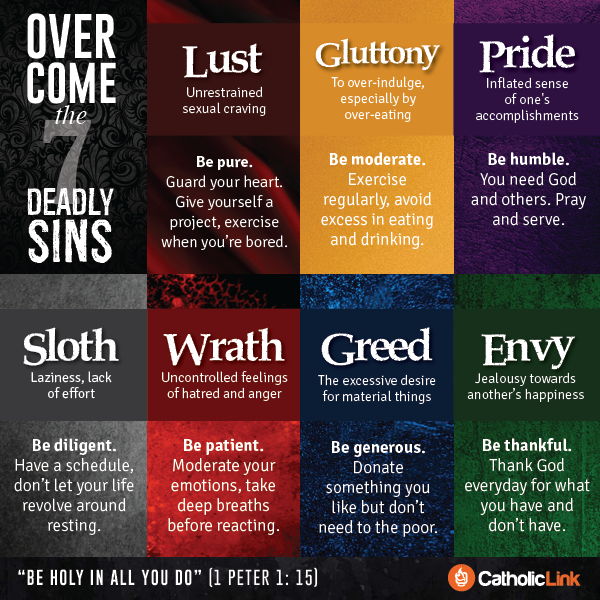Understanding The Intersection Of The 7 Deadly Sins And The 10 Commandments
The moral landscape of human behavior has often been framed by ancient teachings and religious texts. Among these are the 7 deadly sins and the 10 commandments, both of which serve as guidelines for ethical living. While the 10 commandments provide a framework for how one should conduct themselves in relation to God and society, the 7 deadly sins outline the vices that can lead individuals astray. Understanding the relationship between these two sets of principles can illuminate our moral choices and the consequences of our actions.
Throughout history, the 7 deadly sins have been depicted as the root of all immoral behavior, while the 10 commandments serve as a divine code of conduct. The interplay between these two concepts raises important questions about morality, ethics, and the human condition. Are the 7 deadly sins simply the opposites of the virtues promoted by the commandments? How do these ancient teachings resonate in modern society, where ethical dilemmas are more complex than ever? As we explore the 7 deadly sins and the 10 commandments, we'll uncover the profound insights they offer into human nature.
In this article, we will delve into the specifics of the 7 deadly sins and the 10 commandments, examining their historical context, moral implications, and relevance to contemporary life. By bridging these two powerful teachings, we aim to foster a deeper understanding of our own moral compasses. Join us as we navigate this intriguing nexus of ancient wisdom and its significance in today's world.
What Are the 7 Deadly Sins?
The 7 deadly sins are a classification of vices in Christian teachings that are said to lead to further immorality. They include:
- Pride
- Greed
- Lust
- Envy
- Gluttony
- Wrath
- Sloth
What Are the 10 Commandments?
The 10 commandments are a set of biblical principles relating to ethics and worship, which play a fundamental role in Judaism and Christianity. They are as follows:
- You shall have no other gods before Me.
- You shall not make for yourself an idol.
- You shall not take the name of the Lord your God in vain.
- Remember the Sabbath day, to keep it holy.
- Honor your father and your mother.
- You shall not murder.
- You shall not commit adultery.
- You shall not steal.
- You shall not bear false witness against your neighbor.
- You shall not covet.
How Do the 7 Deadly Sins Relate to the 10 Commandments?
The relationship between the 7 deadly sins and the 10 commandments can be seen as one of opposition and complementarity. Each of the sins can be viewed as a transgression of the commandments. For instance, pride could lead to the violation of the first commandment, "You shall have no other gods before Me," by placing oneself above divine authority. Similarly, lust and adultery are directly connected, emphasizing how moral failings can lead to disobedience of these divine laws.
Can Understanding the 7 Deadly Sins Help Us Follow the 10 Commandments?
By recognizing the 7 deadly sins, individuals can become more aware of the internal struggles that may lead to breaking the 10 commandments. Acknowledging these vices allows for a more conscious effort to resist temptation. For instance, someone who identifies feelings of envy may take proactive steps to cultivate gratitude, thus adhering more closely to the commandment "You shall not covet." Understanding this connection can empower individuals to live more virtuous lives.
What Are the Consequences of Ignoring These Teachings?
The consequences of disregarding the 7 deadly sins and the 10 commandments can be profound, affecting both the individual and society at large. Individuals may face spiritual discontent, community alienation, or personal crises. Sociologically, widespread disregard for these moral frameworks can lead to a breakdown in social cohesion, manifesting in increased crime, corruption, and ethical dilemmas in governance and business.
How Can We Apply These Teachings in Modern Life?
Applying the principles of the 7 deadly sins and the 10 commandments in modern life requires introspection and a commitment to ethical living. Here are some practical ways to do so:
- Self-Reflection: Regularly evaluate your thoughts and actions against the 7 deadly sins and 10 commandments.
- Community Engagement: Foster discussions within community groups about these moral principles.
- Education: Teach younger generations about the importance of these teachings in guiding ethical behavior.
- Mindfulness: Practice mindfulness to become aware of temptations and urges that lead to sin.
Conclusion: Why Should We Care About the 7 Deadly Sins and the 10 Commandments?
The 7 deadly sins and the 10 commandments provide a rich framework for understanding human behavior, morality, and ethics. In a world where moral ambiguity is rampant, these teachings can serve as beacons of guidance. They remind us of the importance of self-control, respect for others, and the pursuit of virtue. By understanding the 7 deadly sins 10 commandments, we can navigate our lives with greater awareness and purpose, ultimately enriching our own lives and the lives of those around us.
Unveiling The Mystery: Is Gabby Marshall Married?
Unveiling The Influence Of Joe Mazzulla's Mother
Exploring The Dynamic Duo: Trid And Sheena


